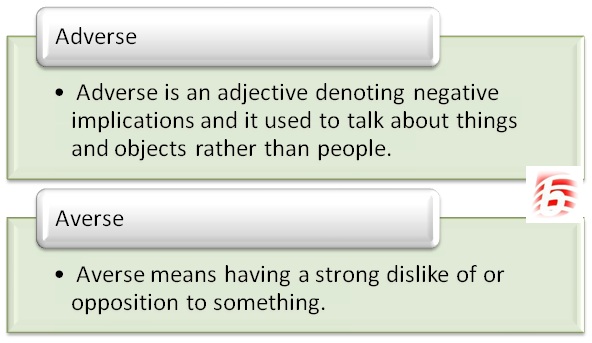Difference Between Adverse and Averse
Table of Contents
Adverse vs Averse
Getting to know the difference between adverse and averse is important as they both look similar at a glance. In English language, there are a good number of words that are liable to be confused due to similarities they share in orthography, pronunciation or maybe in their implications. These differences could lead to alarming confusions in a non-native speaker of English. For such a learner, learning these subtle differences would be often found challenging. The difference between two such words, adverse and averse, would be the primary focus of this article. To begin with, both adverse and averse are adjectives of which the origins are the same, but which denote negative implications. They share similar spellings too with the‘d’ in adverse being the only difference hence many are confused with these two words.
What does Adverse mean?
As the Oxford Dictionaries define it, adverse (pronunciation: (‘advəːs/) refers to preventing success or development; harmful; unfavourable: It is an adjective denoting negative implications and it used to talk about things and objects rather than people. The word is often collocated with adverse weather conditions, adverse health conditions, adverse effects, adverse impacts, etc. A few example sentences would be as follows:
E.g.:
• The development will not have any adverse effect upon bats or other wildlife living in the area.
• Despite the adverse blustery weather conditions, it was clear that Oxford had the edge.
Some synonyms for adverse would include:
unfavourable, disadvantageous, inauspicious, unpropitious, unfortunate, unlucky, untimely, untoward, disagreeable, unpleasant, bad, poor, terrible, dreadful, dire, wretched, nasty, hostile, harmful, dangerous, injurious, detrimental, hurtful, deleterious, destructive, pernicious, disadvantageous, unfavourable, unfortunate, unhealthy.
What does Averse mean?
Oxford dictionary definesaverse (pronunciation: /əˈvəːs/) as having a strong dislike of or opposition to something. Just like adverse, averse denote a negative implication. It is used in the context of someone being averse to something.
For example:
• Strong and aggressive, he is not averse to a bit of shirt pulling and uses his arms effectively to hold off defenders.
• Now, some of you may know that if an opportunity arises of a little fun with a person of the opposite sex I am not averse, rare as it is.
Synonyms of averse include:opposed to, against, antipathetic to, hostile to, antagonistic to, unfavourably disposed to, ill-disposed to, resistant to, disinclined, unwilling, reluctant, loath, etc.

What is the difference between Adverse and Averse?
• The two words adverse and averse are linked in their origin, but they do not share the same meaning.
• Adverse means harmful, unfavourable, or hostile while averse means having a feeling of opposition, repugnance, and distaste.
• Adverse is used with conditions or things rather than with people while averse describes a state of feeling of people.
• Adverse always precedes a noun, e.g. adverse effects, adverse weather, etc. while averse is often used after the ‘be’ verb as a part of the predicate of a sentence.
• Adverse is not followed by a preposition, but averse is followed by the preposition ‘to’.
Reviewing these differences, it is comprehensible that although both adverse and averse may have sprung from the same origin, adverse and averse have distinctly different meanings.
ncG1vNJzZmivp6x7pbXFn5yrnZ6YsqOx07CcnqZemLyue8OinZ%2Bdopq7pLGMm5ytr5Wau26tw6%2Bcq6uVYq6vsIyvqmaZppq%2FtLGO